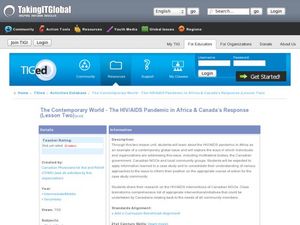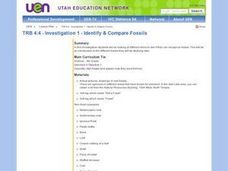Curated OER
HIV and AIDS: Rights & Responsibilities
Address myths and stereotypes surrounding HIV and AIDS in this lesson plan. Students discuss how the disease is transmitted, how to properly apply a condom, and how to handle real life situations. Note: A number of extension activities,...
Curated OER
Up & Away
Students research where balloons go when they fly away, the consequences of their escape, and suggest alternative possibilities for preventing balloon escapes in real life. They identify humorous stories and discuss the qualities that...
Lewiston High School
Weight and Mass & Forces in Equilibrium
I would weigh less on the moon? Send me there, then! On the top of the first page, a cartoon image demonstrates the difference between Earth and the moon. It then goes on to describe weight and mass and provides five practice problems...
Curated OER
2nd Grade - Act. 28: Calendar & Weather Book
Second graders will track the weather patterns throughout the school year. This project spans the school year and takes five minutes per day or less. Measuring, data collection, and predictions are all explored throughout this relevant...
Discovery Education
Sonar & Echolocation
A well-designed, comprehensive, and attractive slide show supports direct instruction on how sonar and echolocation work. Contained within the slides are links to interactive websites and instructions for using apps on a mobile device to...
Curated OER
Exploring Space-Science Puzzlers, Twisters & Teasers
In this space worksheet, students complete 12 different science puzzles, word scrambles, and brain teasers about vocabulary terms from their chapter.
Curated OER
Reflection, Refraction & Lenses
High schoolers are able to describe what happens to light when it strikes different materials. They describe the law of reflection. Students are able to explain why a mirror froms a virtual image. They are able to describe diffuse...
Teach Engineering
Antimatter Matters
Use science fiction movies to teach pupils about antimatter and alternate universes. Individuals learn about the portrayal of antimatter and alternate universes in movies such as Star Trek and Angels & Demons. They consider three...
Curated OER
The Contemporary World - The HIV/AIDS Pandemic in Africa & Canada's Response
Students research the HIV/AIDS pandemic in Africa as an example of a contemporary global issue and will explore the ways in which the disease is being addressed with an emphasis on the Canadian government....
Curated OER
Fruits and Vegetables
Here is a fun way to investigate fruits and vegetables. In this healthy diet and reading lesson plan, learners read and recite several poems about fruits and vegetables. They sort pictures and word cards with assorted names of fruits and...
Curated OER
Calendar & Weather Book
Second graders track weather patterns through the school year. They take daily readings and record them in a weather book.
Curated OER
Investigation 1 - Identify & Compare Fossils
Fourth graders examine different items to see if they can recognize fossils. This be an introduction to the different fossils they be studying later and help them make inferences about past environments of Utah.
Curated OER
Global Water Cycle & Heat Flow
Students experiment to discover how different variables affect the water cycle. They do hat flow experiments and construct a computer heat flow model.
Curated OER
Visualizing a Human Gene with Its Introns & Exons
Students examine the entire DNA base sequence of the human adenosine deaminase gene after it is printed out from the source disk provided. The enormous length of a single gene as well as the immense difference in length between intron...
Curated OER
Do It Yourself: Matter & Energy Interaction Lesson Plan
Students complete a KWL chart describing their knowledge or renewable and nonrenewable energy sources. They examine the Stirling Engine which is an external combustion engine and compare it to a Hero's Engine. They participate in a...
Curated OER
From Polymers to Bioplastics: Looking Toward Finding Renewable Resources
Students investigate the properties of polymers. In this chemistry lesson, students explain the importance of energy sources. They produce a bioplastic from the lab and evaluate its structural integrity.
California Academy of Science
How Big is Big?
In a math or life science class, "mini-me" models are created with cardstock to reflect a 1:10 scale of students' bodies. Learners measure each others' heights with meter sticks, and then reduce the size by 10. After this exercise, they...
Maryland Department of Natural Resources
Eyes on Dissolved Oxygen
Learn about the factors that affect the way oxygen dissolves in salt water with a chemistry lab. After studying the molecular structure of water, young scientists figure out how aeration, temperature, and organic waste affect...
Curated OER
Illuminating Climate Change: Connecting Lighting and Global Warming
Students analyze energy usage and connect energy usage to fossil fuel consumption. In this global warming and pollution lesson, students what fuels are used to generate electricity and how much CO2 each fuel produces, then graph the...
Scholastic
A House for Hermit Crab
Engage young marine biologists in a reading of Eric Carle's A House for Hermit Crab with a fun hands-on activity. Given a set of clipart images of the different aquatic animals that appear in the book, children identify each one...
Curated OER
Bridge Building
Students explore bridges and how they are constructed. After reviewing materials on bridges, they work in groups to record their findings. They design and construct a bridge using K'NEX or straws and predict which bridge will hold the...
Science Buddies
Science Buddies: The Perfect Marriage of Computer Science & Medicine
Find out the real explanation for why your parents are so weird. Here is a project that lets you explore the internet to find out why your "DNA blueprint" is so important to health and disease. In this project you will use methods that...
University of Colorado
University of Colorado: Error, Accuracy, & Precision
A serious paper by serious geographers, discussing at full length the problems caused by error, inaccuracy, and imprecision in Geographical Information Systems. The definitive word in the real world.
US Environmental Protection Agency
Epa: Learn the Issues: Chemicals & Toxics
This site provides real-world issues as well as the scientific research and technology used to support the EPA's mission to protect human health and safeguard the natural environment.























